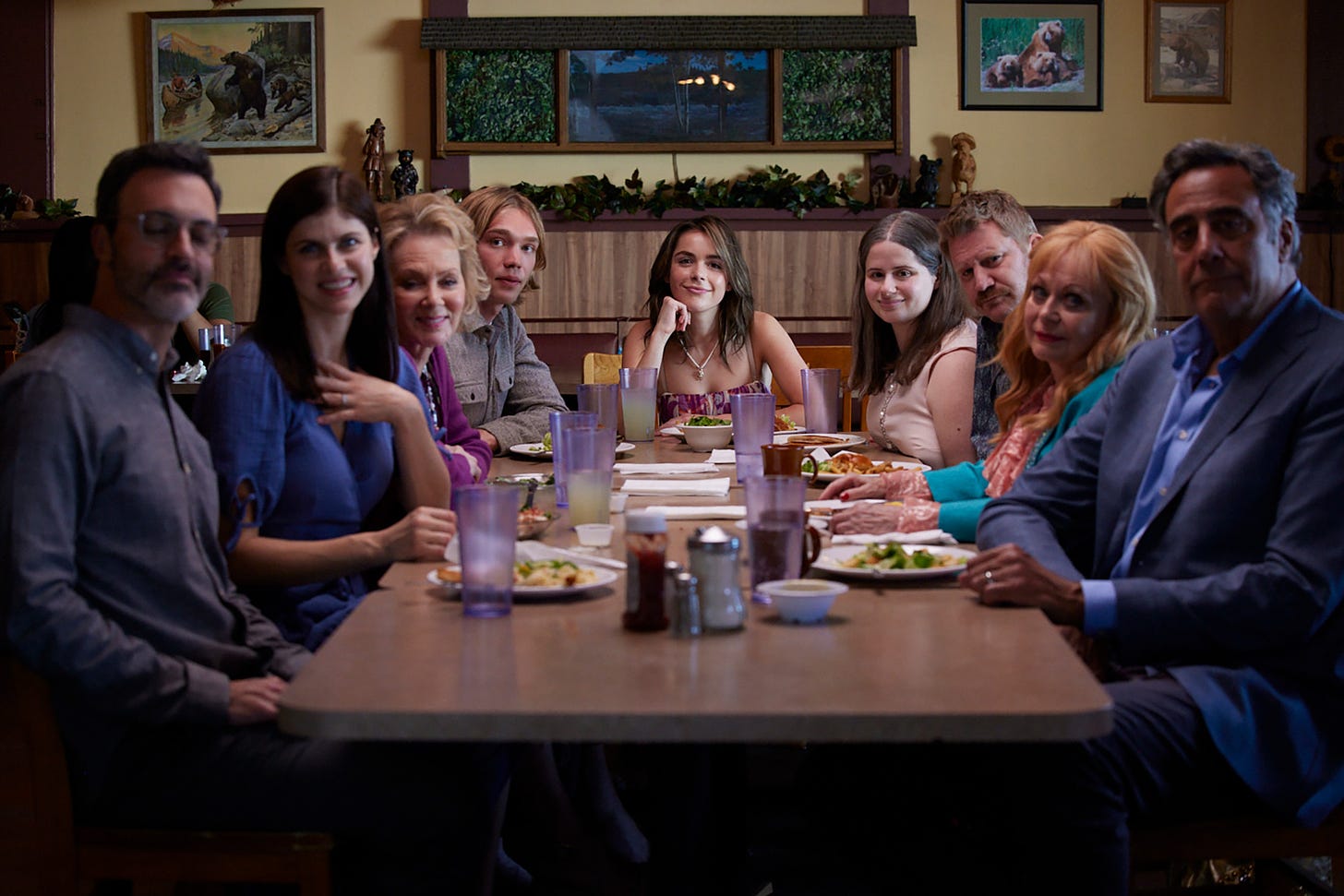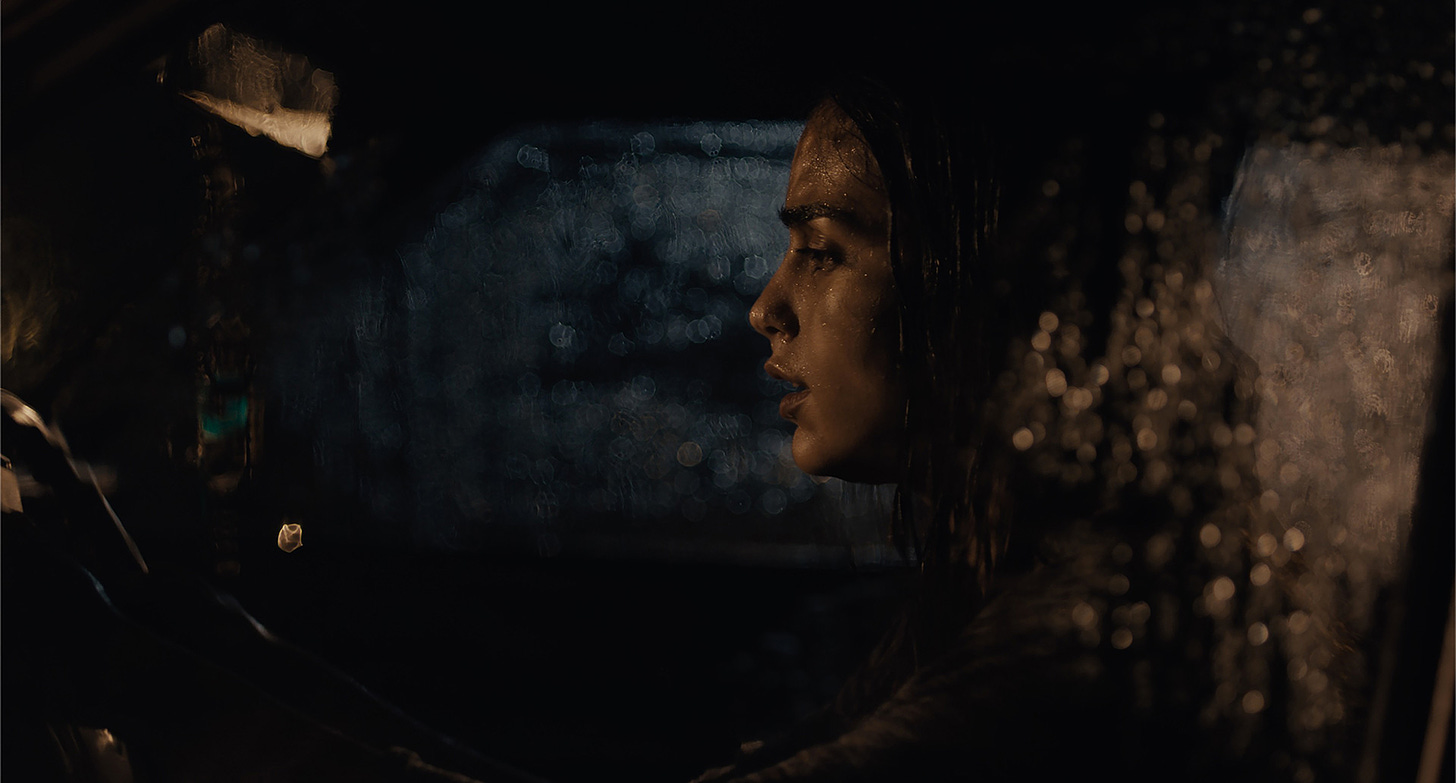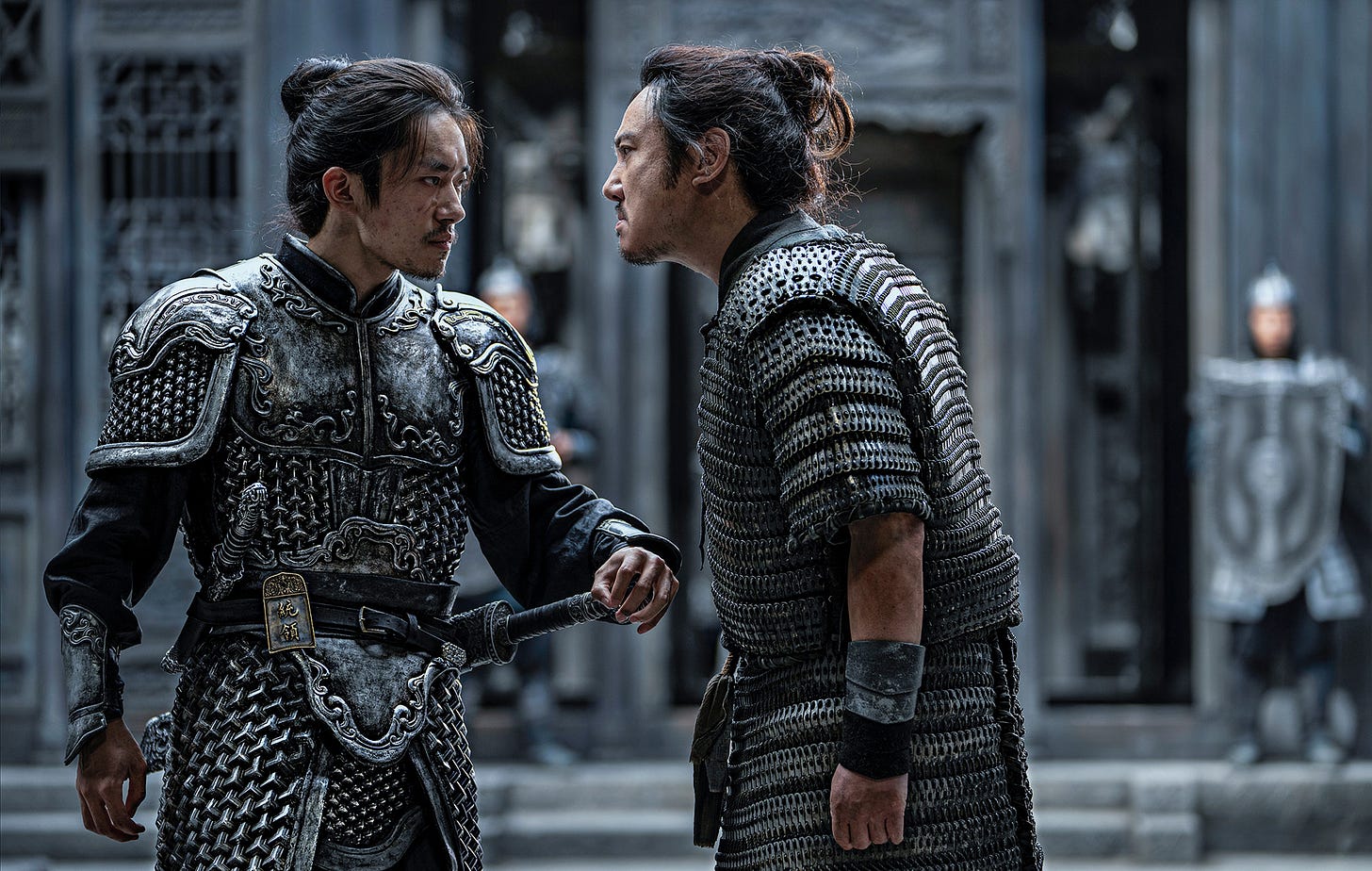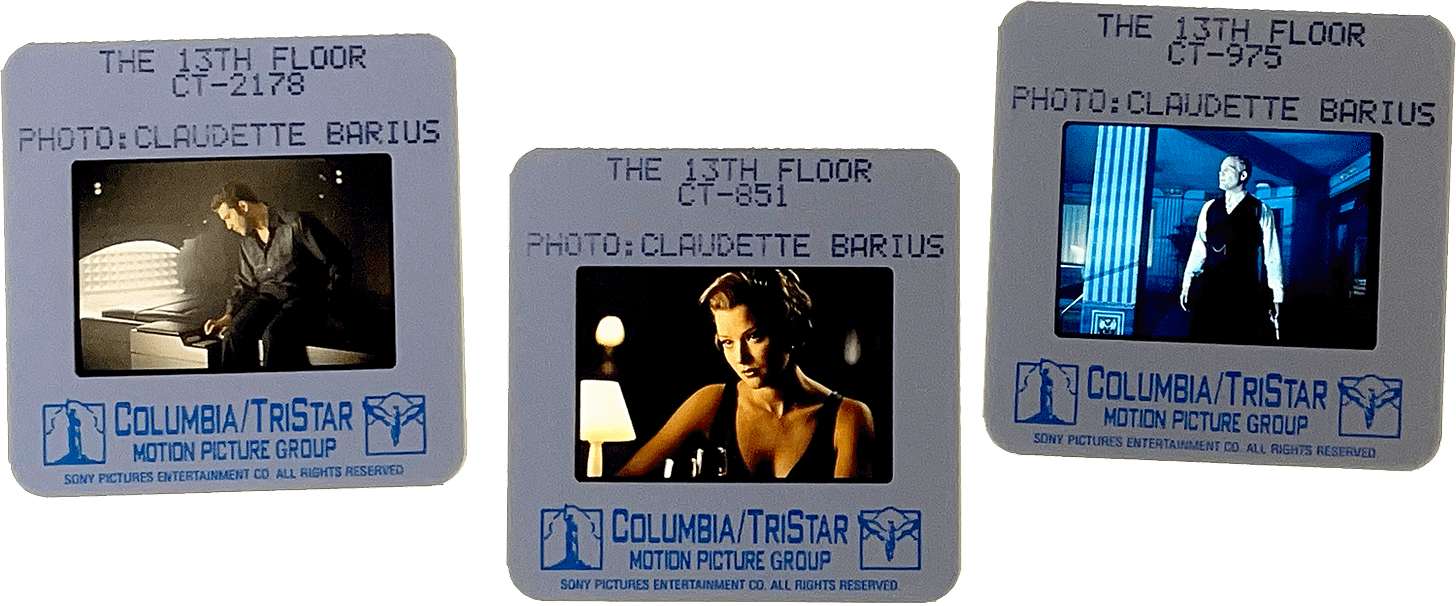Sundance is finished. Berlin is finished. SXSW is just finishing. I’m honestly surprised I haven’t seen too many hyperbolic declarations from critics who have “seen the next big Oscar hopeful” already. I mean, EVERYTHING EVERYWHERE ALL AT ONCE debuted a little more than a year ago at SXSW. I don’t think there were too many people predicting it would be at the Oscars let alone a seven-time winner considering its genre trappings. But you know those few who did say it are feeling pretty good about themselves right now. Maybe even buying a lottery ticket.
I didn’t do too bad with my predictions. Got 6 of 8. Was ecstatic WOMEN TALKING proved me wrong because it was my personal fave in the category. Not so much when it comes to Jamie Lee Curtis’ win—although you can’t be mad she’s now an Oscar winner. Her career speaks for itself. Everyone else in the category was just on a whole other level last year.
As for the show itself, I put some thoughts down in my annual Oscars Recap via Tweets piece. The event was fine. Boring but sturdy with some great speeches countering Jimmy Kimmel’s mostly stale presentation. My issue was with Twitter instead. Whereas I usually have a blast collecting funny and insightful tweets from #FilmTwitter while watching, the rhetoric this year was just plain mean. People were taking things personal. Like they haven’t been watching their favorites lose for decades, suddenly EEAAO was somehow the nail in the coffin of cinema as an art form. It became so over-the-top that I think I’m retiring the piece altogether. Might just watch the show next year with my eyeballs and ears. Hopefully doing so doesn’t simply remind me why I started using Twitter as a lens in the first place. Because I don’t think I want to be that person anymore.
What I Watched:
ALL THE WORLD IS SLEEPING
(now on VOD/Digital HD)
Addiction films generally follow a formula. Unless you’re an outlier like REQUIEM FOR A DREAM, the beats almost always adhere to the trend of feeling immortal, hitting rock bottom, and fighting to get back up (if possible). Ryan Lacen’s ALL THE WORLD IS SLEEPING is one such example that sticks pretty closely to that pattern with the addition of an intriguing structural device splicing in flashbacks as both emotional jolts and narrative context. So, rather than form, it ultimately sets itself apart by possessing a conscious desire for authenticity and complexity within that familiar depiction. With the involvement of seven survivors (Jade Sanchez, Doralee Urban, Myra Salazar, Patricia Marez, Carly Hicks, Kayleigh Smith, and Malissa Trujillo) serving as inspiration, the troubled life of their composite (Melissa Barrera’s Chama) finds clarity by centering impact above cliché.
We can feel it early too during a scene with Chama and her daughter Nevaeh (Adilynn Marie Menendez) sitting at the bus stop. A homeless woman is standing on the corner, yelling to no one. Nevaeh can’t help but wonder what’s happening, asking her mother who she’s talking to and whether she’s crazy. Chama answers the first question quickly: “She’s talking to Jesus.” The second one gives her pause. Why? Because she knows the situation demands more nuance than a simple “Yes.” She’s an addict herself, barely holding onto her own life and sanity as a mother struggling to survive. One wrong step and it could be her on that corner screaming about her guilt, regrets, and unfulfilled dreams. So, she tells Nevaeh, “I don’t know.” She refuses to reduce this stranger to a label because she wants to hope the world will give her the same courtesy.
There’s a great line coming a bit later, though, that holds the reality of so-called “normal” people: that the only thing worse than feeling invisible is feeling disposable. That’s where Chama is. Every hardship is processed as a failure that leads her back to her dealer to get lost even further. Every attempt to do right by her daughter meets crippling anxiety only to put her in that same place with witnesses like her sister (Alexis B. Santiago’s Mari) to guarantee she’ll never forget. And it would be easy for us to blame Chama. To pity rather than empathize. That’s kind of the point. Because it’s only when the nightmare takes hold and leaves her completely alone that she can start to take stock of how she got there. All the little moments and tragedies that pushed her down this unsustainable path.
The second half is thus where the film shines. Those glimpses into the past solidify into memories, the generational trauma and economic strife showing just how quickly someone can get caught in a systemically broken cycle of poverty and addiction. We get comparison points (Mari’s better upbringing saving her from drugs and Jackie Cruz’s BFF Toaster’s not) and unlikely allies (it’s great to see Jorge Garcia acting as it has been a while) for Chama to lean on and fight against as she looks to pick up the pieces of a shattered life. Barrera is very good in the role, juggling the emotional weight of her suffering with the pain she has unfortunately thrust upon her daughter. It’s not therefore about whether she can get Nevaeh back after everything implodes. It’s about whether Chama can get herself back first—enough to see those black-feathered bad omens and finally not pick them up.
- 7/10
FULL RIVER RED
(now in limited release)
“So, for every person who finds the [comedic] tone helps make this mystery feel breezier than you expect, there's bound to be another who cannot separate [its] surface distraction from an otherwise highly convoluted tapestry of convenient twists and turns.” — Full thoughts at The Film Stage.

LEAVE
(now streaming on Shudder)
Abandoned in a cemetery decades ago, Hunter (Alicia von Rittberg) decides the time to find out what happened is now. While her adoptive father (Clarence Smith)—who is also the cop that found her—believes she’s driving to Georgetown to begin her college career, Hunter hops a plane to Norway to try and put the pieces together. The Satanic symbols on the blanket she was wrapped in match those found on a flyer for a Scandinavian black metal band that was in town around the same time as when she was left behind. So, under the belief lead singer Cecilia (Ellen Dorrit Petersen) is her mother, she partakes in a little light stalking to figure out for certain. What she discovers is much more complicated. And much darker.
Director Alex Herron and screenwriter Thomas Moldestad’s LEAVE ensures that we’re prepared for this truth the moment Hunter sets foot on Norwegian land. It’s as though the wolf cross that was left on her finds a connection to an evil entity locked within the country that suddenly reawakens at her presence. This figure begins to haunt Hunter’s dreams with fire—her visage shrouded in darkness and perhaps the ash of whatever tragedy occurred. These are the sort of details that make sense once Cecilia shares the truth of what happened all those years ago. The story of Kristian (Morten Holst) and Anna (Maria Alm Norell) and the insanity that unfolded against the backdrop of the latter’s very religious family coming into conflict with the former’s demonic musical influences. He ended up in a psychiatric hospital. She ended up dead.
Except, of course, that things are never that cut and dry. Enter Anna’s oppressively cultish relatives led by Stig R. Amdam’s Torstein and you must wonder about what’s going on behind the scenes. From tales of tragic ends befalling Norheim women to a rather chilly family reunion upon Hunter’s arrival and you start to want her to listen to the spirit’s words when hissing “Leave!” Is this woman therefore helping her? Maybe. The answers ultimately come very quickly at the eleventh hour, tidily wrapping up what is an overly drawn-out narrative of repetitive examples of patriarchal domineering. I think von Rittberg and the effects work with her character’s nightmares do a good job keeping us invested, though. So, while it takes a bit longer to get to the point than is perhaps necessary (or desired), the payoff thankfully succeeds.
- 6/10
MOVING ON
(now in theaters)
Joyce’s death marks the end of a chapter for Claire (Jane Fonda). One built upon patience. For forty-six years she has sat on the trauma of what happened to her at the hands of her best friend’s husband (Malcolm McDowell’s Howard) for the sake of Joyce’s happiness and now the time has come when she can take her pound of flesh without hurting anyone but herself. Because Claire is fine with the guilt. She’s fine with prison. None of that matters in comparison to revenge. So, she flies in for the funeral, finds Howard in the receiving line, and tells him straight up that she’s going to kill him before the weekend is over.
It’s a goofily macabre premise that Fonda sells with an immovable sense of clarity beyond mere rage. I think that’s the best part of Paul Weitz’s MOVING ON—this character being allowed to be dead-set on what she’s decided to do and unencumbered by anyone who might try and tell her what she feels isn’t justified or right. That’s not to say she doesn’t have someone to sort of play a voice of conscience anyway. Evelyn (Lily Tomlin), Joyce’s former college roommate, has never liked Howard, but she also doesn’t want her friend to go to jail for the rest of her life. So, she uses humor to try and steer things down a different path. Not to save Howard (Evelyn is the only person who knows without a doubt that killing him is justified), but to save Claire. If, of course, she wants to be saved.
The comedy unfolds as an airing of repressed feelings and a reunion between old friends who (consciously or not) went their separate ways as a result of what occurred. Add Ralph (Richard Roundtree), a slew of rambunctious grandchildren, and, perhaps, some glaringly in-your-face commentary where sexuality and race are concerned and there ends up being a lot more in this 85-minute package than you might expect. In the end, though, I think it works. Fonda is fantastic in the lead role, reliving horrors and exorcising demons. Tomlin is just as good, stealing so many scenes with an unmatched delivery and timing. The whole is probably over-written where the plot is concerned, but never when it comes to the characters. So, even when things go overboard, the actors ensure we won’t check out.
- 6/10

RODEO
(now in limited release)
After blowing off work to steal a motorbike (conning suburbanites who sell online by preying upon their toxic masculinity, letting them hold her purse for collateral once they stop laughing at the notion of a “girl rider” before she speeds off while flipping them the bird), Julia (Julie Ledru) hits up a street rodeo to watch and join in with the men doing tricks and weaving down the road. They all yell for her to get lost. To stop getting in their way. To not “hurt” herself. They’re gatekeeping their macho venue to impress women by rejecting her sight unseen as ugly, not good enough, a waste of space. Everyone but Kaïs (Yannis Lafki) and Abra (Dave Nsaman), the latter going so far as to shut the others up and teach her a trick.
It’s the perfect introduction to this underground world of gearheads and criminals who are too insecure to imagine a woman could be anything but a trophy. Why should they when their role model and boss Domino (Sébastien Schroeder) runs things from jail and forbids his wife (Antonia Buresi’s, who also collaborated on the script, Ophélie) and young son (Cody Schroeder’s Kylian) from leaving their house unless they’re visiting him? Julia doesn’t want that for herself—in any of its many forms. She wants the freedom of riding and a community of similarly amoral miscreants to survive on adrenaline rushes for fun and work. As a member of Domino’s B’Mores, she can exist the way she’s always wanted.
Lola Quivoron’s RODEO takes us into this fantasy and exposes the complexities inherent to its creation. Allies won’t always have Julia’s back. Public and private life will diverge to reveal the priorities and fears of those standing in her way and those wishing her courage rubs off to escape their own socially dictated prisons of identity. It’s a powerful journey into the subconscious as well as chop shop danger. Ghosts haunt Julia’s dreams as foreboding specters of a dark fate on the horizon just like the enemies staring daggers at her during the day (Junior Correia’s Manel and others see her as a threat, their inferiority complexes exploding with each new success born out of her actions).
This world is everything Julia has ever wanted and yet its built to become her destruction. It must considering what she stands for as a beacon of independence—a chameleon gliding back-and-forth over lines of gender, sexuality, society, and motorcycle culture. Kaïs and Ophélie are inspired by her. You can read these dynamics as romance if you want, but it’s more than lust or love. It’s about being seen. It’s about finding a purpose beyond the status quo and the existential crisis born from being a part of a family that only fosters equality amongst those who are forced to serve. Julia puts ideas in their heads that they have the power to elevate above those roles of inferiority they’ve been conditioned to accept.
And there isn’t a single inauthentic moment. Partly because of the use of non-professional actors (the riders, including Ledru, whom Quivoron took stories from to help shape the character she would ultimately perform, were selected with chemistry trumping acting experience) and partly the intimate lens in which it’s all captured. We feel the speed of the bikes and risk of the stunts. We sense the frustration and anger when Ophélie struggles to curb Kylian’s tantrums or when Manel peacocks his way into provoking Julia’s wrath. There are few surprises and in turn zero contrivances. Everything evolves naturally as an effect of each player’s motives and true selves. Some cower when confronted. Others pounce. And that’s when we see what’s real. That’s when we discover what family truly is.
- 8/10

WILDFLOWER
(now in limited release; VOD/Digital HD on 3/21)
Matt Smukler’s WILDFLOWER is a case where context is key. It’s one thing to tell the coming-of-age story of a teenager growing up as the child of developmentally disabled parents because you think the subject matter is ripe for comedy and another to know it is because you lived it. The result may still feel exploitative (although good on them for casting disabled artist Samantha Hyde in the role of Bea Johnson’s mother even if Dash Mihok plays her father—the former character being born disabled and the latter a victim of head trauma at age twelve), but the heart still shines through if the purpose is love. Smukler’s niece Christina lived this experience. What’s on-screen is inspired by her truth and based on a documentary he made to showcase her journey. He and co-writer Jana Savage simply decided to also use fiction as a means of bringing that story to a wider audience.
They do a good job smoothing over some problem areas. Like when Bea (Kiernan Shipka) realizes she can use the same tactics for training her dog to train her parents. Getting her mother into the bathroom with Oreos isn’t the payoff. So, while it feels very wrong in-the-moment, the punch line of Bea using those cookies to also “train” her cousins helps acknowledge that the humor lies in these familial relationships rather than the disability itself. Is that enough to justify it? I don’t know. You’ll have to read a review from a disabled person since they are the only ones who can truly judge when something has crossed a line. Because perception still matters whether what’s depicted really happened or not. It’s a fine line with comedy since intent isn’t more important than impact.
That said, it’s easy to get won over by the humor because of that aforementioned heart. Things can get wild since Bea’s extended family is hyperbolically eccentric (Alexandra Daddario and Reid Scott as her aunt and uncle are so “normal” that their normalcy becomes a joke while her grandmothers, Jean Smart and Jacki Weaver, are never without an opinion or action that doesn’t embarrass the group more than anything her parents might do), but they would do anything for each other. Even to their own detriment—a truth that becomes the film’s core message. Because when you’ve grown up as the parent of adults who are supposed to be yours, it can be hard to step back and consider the opposite. Bea doesn’t have to sacrifice her future because of who her mom and dad are, martyr complex or not. She should still be allowed to be a kid.
Smukler and Savage realize this and ensure the narrative deals with the fact that many of the problems Bea faces are self-inflicted. That’s not to say circumstances outside her control didn’t force them upon her, though. Just that she does have a choice. She can go to college. She can have a boyfriend (Charlie Plummer). She can lose the chip on her shoulder and have fun. The script gets a bit cavalier at times with its own choices concerning subject matter (the film is told from Bea’s perspective while lying in a coma, the cause of which, alongside an ongoing pedophilia “gag” when selling school raffle tickets on the Vegas strip, is brushed aside way too easily), but that shouldn’t be surprising since effect being positioned above cause is its modus operandi. WILDFLOWER is playing to its audience. Its first goal is to entertain and that inherently undercuts its dramatic potency.
- 6/10
New Releases This Week:
(Review links where applicable)
Opening Buffalo-area theaters 3/17/23 -
FAST TIMES AT RIDGEMONT HIGH at North Park Theare (late show)
KABZAA at Regal Elmwood
INSIDE at Regal Quaker Crossing
MOVING ON at Dipson Flix; Regal Transit & Quaker Crossing
Thoughts are above.
MRS. CHATTERJEE VS. NORWAY at Regal Elmwood
SHAZAM! FURY OF THE GODS at Dipson Capitol, McKinley Mall & Flix; AMC Maple Ridge & Market Arcade; Regal Elmwood, Galleria, Transit & Quaker Crossing
A SNOWY DAY IN OAKLAND at Regal Elmwood
Streaming from 3/17/23 -
BOSTON STRANGLER - Hulu on 3/17
IN HIS SHADOW - Netflix on 3/17
LEAVE - Shudder on 3/17
THE MAGICIAN’S ELEPHANT - Netflix on 3/17
NOISE - Netflix on 3/17
WE LOST OUR HUMAN - Netflix on 3/21
JOHNNY - Netflix on 3/23
Now on VOD/Digital HD -
BACK TO THE DRIVE-IN (3/14)
THE BLIND MAN WHO DID NOT WANT TO SEE TITANIC (3/14)
COCAINE BEAR (3/14)
FULL TIME (3/14)
THE LAKE (3/14)
UNWELCOME (3/14)
“The filmmakers are so intent on pushing Maya and Jamie's backs against the wall of sanity and decency that they kind of forget just how silly their climax proves by comparison. Thankfully, that imbalance doesn't ruin the experience.” — Full thoughts at HHYS.
THE NOVELIST’S FILM (3/15)
THE RESURRECTION OF CHARLES MANSON (3/16)
ALL THE WORLD IS SLEEPING (3/17)
Thoughts are above.
AMERICAN CHERRY (3/17)
ARE YOU LONESOME TONIGHT? (3/17)
“If there's one part of Are You Lonesome Tonight? that excels higher than the cast's performances, it's the production value and mood.” — Full thoughts at The Film Stage.
PINBALL: THE MAN WHO SAVED THE GAME (3/17)
SUPERCELL (3/17)
THERAPY DOGS (3/17)
“That's why Therapy Dogs is undeniably authentic regardless of whether some sequences are staged. It's a kinetic, hopeful snapshot of today's generation finding itself on its own terms.” — Full thoughts at The Film Stage.








